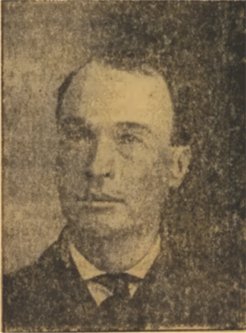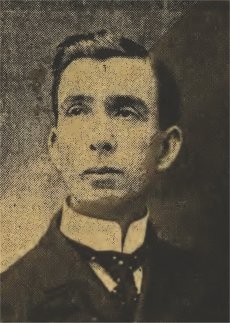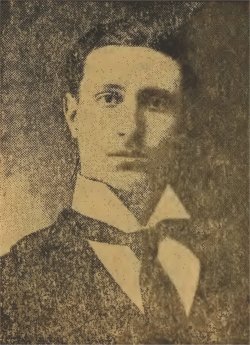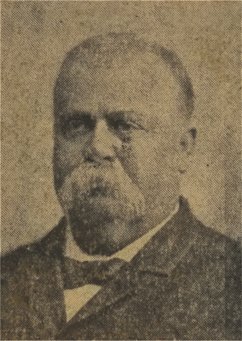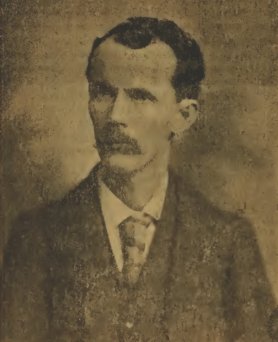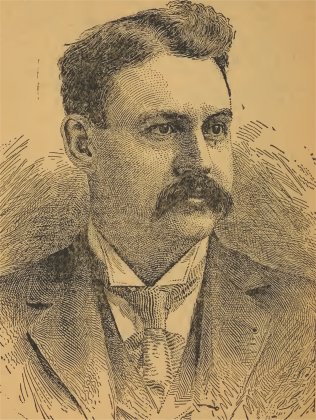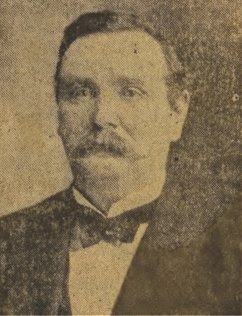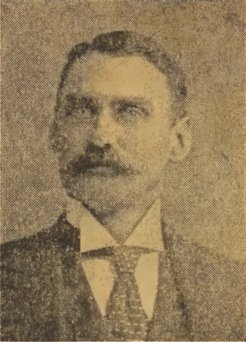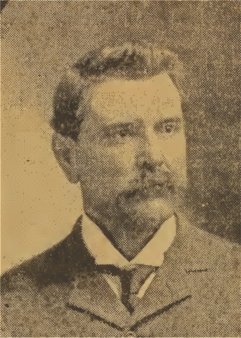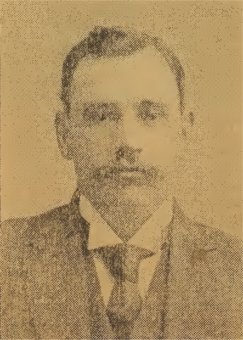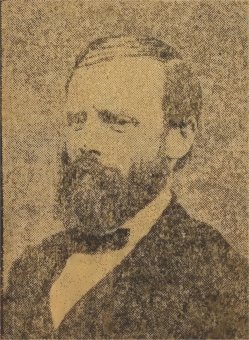 |
||||||||
|
||||||||
| In the early days of Wilkes county the bottoms along the Yadkin and Reddies River at the junction of the rivers was heavily timbered with tall cedars. The buzzards of all the adjacent country would gather there to roost in those cedars. The bottoms were cleared by the late John Finley and were so productive that the name "buzzard roost," was very appropriately, and as long as Mr. Finley lived the bottoms were known as "John's buzzard roost." | ||||||||
|
In his day General James Wellborn was probably the most prominent man in the county. He married Rebecca Montgomery, one of the two heirs to the large tracts of land known as the Moravian surveys. James Wellborn was appointed General of the militia about the close of the Revolutionary War. From the year 1796 to 1835 General Wellborn served in the State Senate thirty years. He served in succession from 1796 to 1811, from 1817 to 1821, in 1823 and 1824, in 1828 to 1829, in 1832 and in 1834 and 1835. Prior to 1835 members of the General Assembly were elected each year, so Wellborn was elected thirty times in 39 years. The fact that a men can stand so popular for 39 years is honor enough for one man. I doubt if the world can furnish a like example. During his terms in the Senate General Wellborn made strenuous efforts to have the State build a turnpike road from the mountains to the sea, but he failed. That was before any railroads were built in North Carolina and the turnpike would have been a great thing for the people of the west, but east had the majority and they knew that the people of the west had to come to them for their necessities, turnpike or no turnpike, and they were not willing to be taxed to build the road for accommodation of the people of the west. It was largely through the efforts of General Wellborn that his brother-in-law Montford Stokes, was twice elected to the United States Senate and once elected to Governor of the State. He was buried on his plantation about 3 miles west of Wilkesboro. |
||||||||
| Anderson Mitchell was at one
time a distinguished citizen of Wilkes; he was born in Caswell county in the
year
1800; was educated at Bingham School and at the State University at
Chapel Hill where he graduated in 1821. He read law under George
Henderson and admitted to the bar in 1823.
Mitchell located in Jefferson, Ashe county, to practice his profession. In 1827, and 28 and 29 he represented Ashe county in the lower branch of the Legislature and in 1838 he was elected to the State Senate. In 1840 he moved to Wilkesboro and the same year was elected to the State Senate from Wilkes. In 1842 he was elected to Congress but resigned in 1843 to devote his entire time to the practice of law. In 1859 he removed to Statesville. In 1866, he was appointed Judge of Superior Court, and in 1872 was elected, without opposition, to succeed himself as Judge and he served until his death in 1876 when Governor Brogden appointed D. M. Furches to succeed him. On Dec. 24th, 1876, he died and was buried in the cemetery in Statesville. Judge Mitchell's conduct during the Ku Klux era in North Carolina has won for him lasting fame. In his district there was no such thing as Ku Klux allowed; neither was there any necessity for such, for all the violators of the law were punished without fear or favor. Our distinguished county man Anderson Mitchell Vannoy was named after him and was a close companion of the Judge until his death. Mitchell was an able lawyer, an excellent Judge, and a great and noble man. |
||||||||
|
The subject of this sketch was born Jan. 24th, 1834. He enlisted in the 37th N. C. Regiment and on its organization at High Point, Nov. 20th, 1861, he was elected Lieutenant-Colonel of the regiment. At Fuzzell's Mill Lane's Brigade, led by Col. Barber, recaptured the Confederate entrenchments, which had been lost by other Confederate troops, on the Darbytown road in the presence of General R. E. Lee. At Gravely Hill helped the regiment in a hot fight and was wounded in the engagement. The officers of Lane's brigade presented their leader with a sword and a General's sash at Moss Neck and Col. Barber was chosen to present the presents which he did in a neat and graceful speech. Col. Barber was engaged in the battle of Fredericksburg and performed his duty bravely. At Chancellorsville he grappled with the enemy bravely and drove them back but he described the fight by his regiment as the bloodiest battle he ever saw. He was wounded in the fight at Jones' farm near Petersburg on Sept. 30th, 1864, and died from the wounds on the 3rd of the following October. His remains were brought to Wilkesboro and buried in the Episcopal cemetery. |
||||||||
| Lee Carmichael was a prominent man in Wilkes before the Civil War. He was a fine lawyer and was a candidate for Congress against General Thomas L. Clingman. He represented the county in the Legislature a number of times. He died about the close of the war. | ||||||||
|
Thomas C. Land is one of the landmarks of the county. He was born March 18, 1828, and was raised on a farm, attending the old field schools a few weeks for a part of the winters. He attended old Beaver Creek Academy for a short time while Hugh Stokes was principal. At the outbreak of the war he joined Col. Sidney Stokes company as a private and served during the war. He was appointed commissary and later corporal. In the Seven Days Fight around Richmond he was wounded and was allowed to come home on furlough. During his absence from army he was appointed Lieutenant-Colonel of the 53rd Regiment, which position he assumed on his return to the army. He was wounded at the battle of Winchester and a number of other times but not, seriously. After the war Col. Land returned to Wilkes and engaged in teaching school and farming. In 1870 he went to Oregon and took up land and lived there until 1884 when he returned to Wilkes. In 1891 he again went to Oregon and lived there until 1898 when he returned to Wilkes and where he has lived since. While in the West he engaged in farming, teaching and mining. Col. Land has considered literary talent and is the author of the popular ballad, "The Death of Laura Foster, It and a number of poems. Col. Land has been fond of hunting and while in the West he had a little experience in hunting deer, bear, and elk. He has the horns a large elk that he killed which he prizes very highly. Col. Land is at present a member of the county Board of Education the only office he over held. |
||||||||
|
By F. B. Hendren |
||||||||
|
|
||||||||
|
|
||||||||
|
Rev. W.R. Bradshaw, the pastor of the Baptist church in Wilkesboro and North Wilkesboro respectively, was born in Burke county, N.C. on the 14th day of July, 1866. His father was a farmer and young Bradshaw worked on his father's farm until he was 18 years old. He attended district school a few months in the winter, and at 18 years of age he entered Amherst Academy, situated near his father's farm, under tuition of Rev. R. L. Patton, one of the ablest ministers and educators in the State. Here he was fitted for college and, having decided to enter the ministry, matriculated at Wake Forest College in the fall of 1888 and graduated in the class of '92. The following fall he assumed the principalship Moravian Falls Academy and also took charge of the Baptist church at Moravian Falls, and during the year had charge of other churches in this county. Soon after his remova1 to his county he took charge of the Baptist churches at Wilkesboro and North Wi1kesboro respectively. These pastorates he has most acceptably and successfully filled up to the present time. He has received several calls to good churches in other towns in this State but has uniformly declined them. Under his eloquent sermons and wise ministry the churches in the two Wilkesboros have enjoyed a most gratifying and steady growth. Nor does his influence cease at the borders of the two towns, but reaches out all over the county, throughout which he is well known. He is also a prominent personage on the floor of the Baptist State Convention and occasionally electrifies it with his bursts of eloquence. He is often referred to as the "Boy Orator of the Mountains." Pure in life and chaste in demeanor, he is yet the stern and uncompromising enemy of evil in every form, especially of the liquor evil. He is prominently connected with the educational interests of the county. |
||||||||
|
The Hustler, North Wilkesboro |
||||||||
|
|
||||||||
|
T. J. Robertson |
||||||||
|
The Hustler was established in July, 1896, by T. J. Robertson, the present owner and editor. It was a three column, 8 page paper. On Jan. 2, 1898, the entire outfit was destroyed by fire and not a cent of insurance on the plant. Mr. Robertson assumed the proportions of the name of his paper and in two weeks a new outfit was put in and re-appeared in an enlarged form - a 5 column, 8 page paper. The Hustler has made steady advancement and now has a firm hold on the people of North Wilkesboro and the county. The editor and owner, T.J. Robertson, was born in Pittsylvania county, Va. Feb.27,1865. In 1877 his parents moved to Kernersville, NC., where he received an academical education. He came to North Wilkesboro in 1895 and was editor of the North Wilkesboro News until 1896 when he established The Hustler. |
||||||||
|
The Chronicle, Wilkesboro |
||||||||
|
|
||||||||
|
Robert A. Deal |
||||||||
|
The Chronicle was established at Lenoir by H. S. Blair in 1887, but a month or so later was moved to Wilkesboro, and has been published continuously ever since. Soon after the paper moved to Wilkesboro, R. A. Deal bought it and has owned and conducted it ever since. In 1899 he bought the Mountain Breeze and the two offices were consolidated. Robert Avery Deal, editor and owner of The Chronicle, was born in Caldwell county Dec. 6, 1863, and was raised on the farm, attending the public schools a part of the sessions. He attend Rutherford College under Prof. R. L. Abernathy for about two years, going in debt for his tuition. After leaving Rutherford he taught school, and and when The Chronicle was established he worked with it until he bought the paper, paying the last of his Rutherford College tuition after coming to Wilkesboro. On Feb. 7, 1900, he was married to Miss Mamie Wallace, by which union two children have been born. Mr. Deal is a man of deep thought, and by close application has made a reputation for thoroughness in whatever he undertakes. He is an ardent democrat and an earnest worker for his party, having served for a number of years as chairman of the county executive committee. He was postmaster at Wilkesboro during Cleveland's last administration. |
||||||||
|
The Yellow Jacket, Moravian Falls |
||||||||
|
|
||||||||
|
R. Don Laws |
||||||||
|
The Yellow Jacket was established by R. Done Laws in June, 1895, as a three column, four page, monthly paper. When the paper was started out in the country, away from any public road and two miles from the post office, many people predicted the thing a failure. As the name implies, the Yellow Jacket was from the beginning a "warm baby." It discusses politics almost exclusively from a republican standpoint. The paper has been enlarged from time to time until now it is a five column folio and is issued twice a month. The circulation has built up wonderfully. The paper now has about 20,000 subscribers in every State in the Union. In order to issue the paper in such quantities it was necessary to install new machinery from time to time. Now the Yellow Jacket outfit is the best printing plant in this section of the State. The paper is about to outgrow its present equipment and Mr. Laws is making arrangements to put in a perfecting press. R. Don Laws, the editor and proprietor of the Yellow Jacket was born in Wilkes county in 1868, and worked on the farm till he was 21 years old. Mr. Laws printed the following account of himself in his paper sometime ago: Mr. Laws is a man of more than ordinary talents with and seems to be specially suited to the work he has adopted. He married Miss Dora Wallace and they have three children. |
||||||||
|
The Patriot, Moravian Falls |
||||||||
| The Patriot is a three column four page paper established a few months ago by James Larkin Pearson. Mr. Pearson is a 23 years old. He is widely known throughout this county as a poet, having been writing verse since his youth. He made his first printing press out of wood. | ||||||||
|
The Blue Ridge Baptist, North Wilkesboro |
||||||||
|
|
||||||||
|
A. C. Hamby |
||||||||
|
The Blue Ridge Baptist was established in Wilkesboro in 1900 with Rev. W. R. Bradshaw and F. B. Hendren editors. The next year the paper changed hands and A. C. Hamby became editor and D. W. Lee manager, and the paper was moved to North Wilkesboro. The Baptist is a clean religious paper and speaks well for its young editor and manager. A. C. Hamby, editor, was born in Wilkes county Aug. 28, 1876, and worked on his father's farm until ho was 17 years old. He attended Bethel Hill Institute, Trap Hill Institute, Whitehead Academy, and he also spent nine months at Wake Forest College. He paid his tuition and board by teaching and working as a farm hand. He also attended the Blue Ridge Institute for one session. He was licensed to preach by his church, but has not yet been ordained. D. W. Lee, manager of the Baptist, was born June 23, 1875, was raised on the farm and attended school at Bethel Hill, Trap Hill and Whitehead. At the last named place he taught a commercial department for one session, He was principal of New Hope Academy in 1898 an 1899. In 1900 he, in copartnership with his brother, established the Baptist Instructor which was consolidated with the Blue Ridge Baptist in 1901. |
||||||||
|
The Curfew, Brewers |
||||||||
| The Curfew was established in 1898 by W. L. Brewer and J. J. Spicer at first it was a 3 column, 4 page paper but it has been enlarged to a 6 column, 4 page paper. Mr. Brewer, the present editor is a man of character and ability. (Further particulars about the Curfew have not reached the author.) | ||||||||
|
|
||||||||
|
John S. Cranor |
||||||||
|
John Samuel Cranor was born at Rockford, in Surry county, April 26, 1847. When he was about ten years old his father moved to Wilkesboro and engaged in running a hotel. In 1864 he entered the Confederate army, being then only 17 years. Ho enlisted in Company B, and was intended to be assigned to the First Battalion North Carolina Reserves and was stationed at Camp Vance for instructions. Here he was captured by Col. Kirk of the Federal army and was carried as a prisoner of war to a prison camp at Chicago, where he was kept for twelve months. While in prison he endured many hardships and witnessed the death of many comrades from exposure and hardships. After being paroled after peace was proclaimed he returned to Wilkesboro, studied law and was admitted to the bar in 1868. On Nov. 27, 1872, he was married to Miss Sarah Taylor and to them were born nine children. Mrs. Cranor died in May, 1902. Mr. Cranor was Register of Deeds from 1884 to '86. In 1893 he represented the district in the State Senate; he was elected by 745 majority when the majority was usually about that much for the opposition party. Mr. Cranor is at present mayor of the town of Wilkesboro. |
||||||||
|
Frank B. Hendren |
||||||||
|
|
||||||||
| The subject of this sketch was born Feb. 24, 1860, and worked on the farm until he was 21 years old attending the public schools about two months during the winter for a part of the winters. He entered Moravian Falls Academy and was prepared for college by Rev. Geo. W Greene principal of the academy. Before entering college he taught school in Ashe county one year and at Vashti academy, in Alexander county, one year. In 1884 he entered Wake Forest College and graduated in 1888. After his graduation he taught school for ten years, teaching in Montgomery county, in High Point Female College, in the Winston Graded Schools, in Jackson county, and finally for four years was principal Moravian Falls academy. In 1895, he was admitted to the bar, but taught school two years after. In 1898 he moved to Morganton and formed a partnership with J. F. Spainhour for the practice of law. He returned to Wilkesboro in 1900 where he has since resided practicing his profession. While he was at Morganton he was elected County Superintendent of Schools of Burke county. Mr. Hendron is a ripe scholar and an able jurist. He is an enthusiastic member of the Baptist church. | ||||||||
|
|
||||||||
|
|
||||||||
|
The subject of this sketch was born in Wilkesboro Oct. 14, 1855 and was educated by his father, Rev. R. W. Barber; he read law at Lenoir under Col. Geo. N. Folk and was admitted to the bar in 1879. In 1882 he formed a copartnership with Col. W. H. H. Cowles and the practice law; the partnership existed until 1887, several years after Col. Cowles had been elected for Congress and was mutually dissolved; since that time he has practiced law alone in Wilkes and adjoining counties. In early life he showed a fondness for politics and since 1876 he has been an active worker for his party. He has several times been chairman of the County Executive Committee of the Democratic party; he served eight years as a member of the executive committee for the judicial district, four years as chairman; for ten years he has been a member of the Congressional Executive Committee, two years as chairman, and is still a member of the committee; he also served six years as a member of the State Executive Committee. He was clerk to the committee in Washington of which Col. Cowles was chairman, but he resigned in 1889 after serving nearly two years, to take his seat in the State Senate to which he was elected the previous year. In 1890 he was the Democratic candidate for Solicitor in this district; he canvassed the district against Hon. Thomas Settle, the Republican candidate.. As the district was largely Republican Barber was defeated but he ran ahead of the ticket. Mr. Settle resigned in 1893 and Gov. Thos. M. Holt appointed Mr. Barber to succeed him and he served till 1895. In 1894 he was again nominated by his party for Solicitor but with his party he went down in defeat in that memorable campaign of 1894, again running ahead of his ticket. In 1891 he was married to Miss Wilcox, daughter of Dr. J. O. Wilcox of Ashe county, and four children bless their home. Mr. Barber stands in the fore front in his. profession. |
||||||||
|
Frank D. Hackett |
||||||||
|
|
||||||||
| Mr. Hackett was born near Wilkesboro June 14, 1857. His father was a distinguished educator and his mother was a Miss Sturgis, daughter of Judge Sturgis of the Georgia Supreme Court. He studied law under Maj. Bingham of Statesville, and was admitted to the bar in 1890. He was Distillery Surveyor during Cleveland's second administration. In the Legislature of 1899 he was assistant to the Principal Clerk of the House; in 1901 he was again selected for the same position. In 1900 he was a candidate before the Democratic convention for the nomination for State Auditor, but retired in favor of Maj. Dixon. | ||||||||
|
Lytle W. Hickerson |
||||||||
| The subject of this sketch was born in Boone county, Arkansas, Aug. 20, 1874. When he was about seven years old his parents moved to this county. Lytle worked on the farm and attended to the academic school at Ronda; he also went to Moravian Falls Academy two years and finally took the four years course at the State University at Chapel Hill, after which he studied law at Statesville. under Judge R.F. Armfield and was admitted to the bar. He located at North Wilkesboro where he has since lived. He married Miss Jarvis, daughter of L.A. Jarvis, of North Wilkesboro. | ||||||||
|
Richard N. Hackett |
||||||||
|
|
||||||||
|
The subject of this sketch was born in Wilkesboro on the 4th of Dec. 1866. He was educated at the State University at Chapel Hill where he graduated in June, 1887. Then he took up the study of law under Col. Geo. N. Folk, and in September, 1888, was admitted to the bar. He located in his native town and has become one of the ablest jurists and advocates in this section of the State. Mr. Hackett has always taken a lively interest in politics, and when he was only 21 years old he was chosen as chairman of the county Democratic Executive Committee and he served continuously for six years. While he was chairman his party made steady gains until in the election following the last campaign under his direction a part of the Democratic nominees were elected. For more than ten years he has been a member of the State Democratic Executive Committee. At all times he had taken an active personal interest in the advancement and campaigns of his party, and he is one of the most forceful orators in the West. In 1889 he was Commissioner of State to represent North Carolina in New York at the centennial anniversary of Washington's Inauguration. In 1896 he was a candidate for the Legislature but was defeated though he led the Democratic ticket by 300 votes. In 1898 he was a candidate for the nomination for Congress from the eighth district and was defeated by only four votes. In 1900 his name was again brought before the convention, but he was defeated by J. C. Buxton, after which he gracefully took the stump and canvassed his district for Buxton. In the campaign preceding the August election of 1900, Mr. Hackett canvassed the northwest portion of the State in behalf of the State ticket and the constitutional amendment. In 1901 he was appointed Assistant Secretary of State for the purpose of annotating and indexing the laws of the General Assembly for the session of 1901. He is an officer of the Grand Lodge of Masons of North Carolina, and is an earnest worker for the order, especially for the orphanage of the order. He is a distinguished looking gentleman of pleasant and agreeable manner, a man of unsullied honor, a lawyer of much ability, and one of the coming statesmen of North Carolina. |
||||||||
|
Herbert L. Greene |
||||||||
|
|
||||||||
|
Mr. Greene was born in Wilkesboro May 28, 1866, and was educated at the Wilkesboro Academy and at the State University. He read law under Col. Geo. N. Folk and was admitted to the bar in 1887. Instead of becoming a candidate for office he stuck to the practice of law and, in partnership with T. B. Finley, has built up a large practice. Although against his wishes, he was nominated for the Legislature in 1900 by the Democratic party, and he represented the county in the next General Assembly. Mr. Greene has been chairman of the County and also the Congressional Executive Committees of his party. Mr. Greene is the author of the bill enacted by the Legislature of 1901 commanding the commissioners of Wi1kes county to build a new court house. He also helped to secure the passage of the bill to build the Wilkesboro and Jefferson turnpike by the penitentiary convicts. He was married in 1898 to Miss Davie Wellborn. |
||||||||
|
Hugh A. Cranor |
||||||||
| Mr. Cranor is a son of John S. Cranor and was born in Wilkesboro Nov. 20, 1875. He attended Wilkesboro Academy and the State University; studied law at the law department of Wake Forest College and was admitted to the bar in 1902. He is a bright young lawyer and has a promising future. | ||||||||
|
Col. Thomas J. Dula |
||||||||
| The subject of this sketch was born in Caldwell county and was raised on the farm; he attended the common schools and Emory and Henry college. He studied law under Judge Anderson Mitchell and was admitted to the bar about 1855 and located at Lenoir; in 1858 he was elected to the Legislature from Caldwell. When the Civil war broke out he entered the Confederate army as a private in company I, 26th NC regiment. He was detailed to return home and form a new company; he was elected Major and later was promoted to Lieutenant Colonel [of the 58th North Carolina Infantry]. During the war he was twice wounded. In 1871 he moved to Wilkesboro and the next year was elected to the Legislature, and also in 1875 he was elected a delegate to the Constitutional Convention. In 1876 he was the Republican nominee for Congress but was defeated by Maj. Robbins. In 1900 he was elected to the State Senate. | ||||||||
|
L. C. Carter |
||||||||
|
Littleton Calhoun Carter was born May l4, 1871, and was raised on the farm. He was educated in the common schools and at Fair View College, Trap Hill. For a number of years he engaged in teaching school. At the age of 22 he began the study of law under Maj. Bingham of Statesville, and seven months later was admitted to the bar. |
||||||||
|
Thomas B. Finley |
||||||||
| The subject of this sketch is the son of the late Augustus W. Finley,
one of the wealthiest and most influential men that ever lived in the
county. His mother's maiden name was Miss Martha Gordon. On his
farm - where North Wilkesboro now stands -in the year 1862 was Thomas B.
Finley born, During his boyhood he worked hard on the farm, keeping his
work apace with that of the negroes hired by his father. He was educated
at Wilkesboro Academy, Finley High School at Lenoir and at Davidson
College he won a gold medal for declaiming. He read law under Col. Geo.
N. Folk and was admitted to the bar in 1885. After receiving his license
he located at Wilkesboro to practice his profession. He formed a
partnership with H.L. Greene which exists up to this time. Mr. Finley has been the promoter of many of the business institutions of this county. He was one of the men who planned and founded the town of North Wilkesboro; he was the first man to advocate the establishment of the Bank of North Wilkesboro and it was largely through his efforts that the bank was established. At present he is a director of the bank. In 1888 he canvassed the county in favor of the county issuing, $100,000 bonds for the construction of a railroad to Wilkesboro. He has helped to promote several other business institutions. Although strenuously urged by his friends Mr. Finley has never been a candidate for office. In 1902 he was specially urged to become a candidate for Judge of the Superior Court; although assured of the nomination he declined to abandon his practice. He has appeared in a majority of the civil cases tried in the county since he was admitted to the bar. In 1893 he was married to Miss Carrie Lizzie Cowles, and five children bless their home. |
||||||||
|
James W. McNeill |
||||||||
|
The subject of this sketch was born in Beaver Creek township Feb. 3, 1872. Until he was ten years old he lived on a farm and attended the public schools; in 1882 his father, Rev. Milton McNeill, was elected Sheriff of the county and moved his family to Wilkesboro where they have since resided. The subject of this sketch attended Wilkesboro Academy, and in 1892 entered Wake Forest College and took a special course preparatory to the study of law, He studied law at the State University and was admitted to the bar in 1895. Before entering college he was Deputy Clerk of the Superior Court under his father. After obtaining license to practice law he located at Winston for six months. In 1896 he located in Wilkesboro and became the law partner of Solicitor Mott. During this partnership and since he has done much work for Mr. Mott, acting as Solicitor pro tem. In 1899 he formed a partnership with his brother R. H. McNeill and they now have offices in Wilkesboro and Jefferson, and at each place they have a large practice. In 1900 Mr. McNeill was nominated for the Legislature by the Republican party and was elected by 259 majority, but by means of the trickery of political machines four largely Republican precincts were thrown out by the Canvassing Board, thus giving the place to another man by 4l majority. In 1900 he was married to Miss Anna Gertrude Johnson of Raleigh. At the present time Mr. McNeill is the chosen candidate of his party for Solicitor in this district; his chances of election are good. The experience he has had as Solicitor pro tem, makes him specially qualified for the office, while his services as Solicitor have distinguished him as an able prosecuting officer. Mr. McNeill is a distinguished looking gentleman and is one of the most gifted orators in this section. He had made a marked success as a lawyer - seldom equaled in so short a time - and a bright future is before him. |
||||||||
|
Luther N. Lyon |
||||||||
| Mr. Lyon was born in Wilkes county Jan. 24 1871, was raised on a farm and was educated in the common schools and academies of his section. He taught school for a number of years, and then read law at the State University and under Chas. H. Armfield and was admitted to the bar in 1899. He is located at Wilkesboro. His great-grandfather Jacob Lyon, was a soldier in the revolutionary war and was in the battles of Brandy Wine and Kings Mountain. | ||||||||
|
Dr. J. W. White |
||||||||
|
|
||||||||
|
Dr. White was born near Hamptonville in Yadkin county March.9, 1861 and was raised on the farm. When he was only six years old his father died leaving three children, two younger than the subject of this sketch. Upon he became old enough the duty fell upon him to take the lead in caring for his mother and plantation. He received his literary education in the public schools academies of his community, and he attended Jefferson Medical College, Philadelphia, where he graduated in 1889. He practiced Medicine at Osbornville four years and then moved to Wilkesboro where he has since resided. He has also taken two post graduate courses. He is a member of the North Carolina Medical Society and in 1898 was elected Vice President of that body. He was county physician for about four years. In 1898 h was married to Miss Pearl Sydnor and one child blesses their home. |
||||||||
|
Dr. Geo. Doughton |
||||||||
| The subject of this sketch was born in Alleghany county in 1860 and was raised on the farm; was educated in the public schools and academies of the community, and is a graduate of the Baltimore college of Physicians and Surgeons and a post graduate of the New York Polyclinic in the class of 1891. He has also attended several other short courses - at John Hopkins and elsewhere. At present he is local surgeon for the Southern Railway, surgeon for the Penitentiary convict camp. In 1888 he was married to Miss Nannie B. Edwards and they now; have four children. | ||||||||
|
Dr. Wm. P. Horton |
||||||||
| The subject of this sketch was born in Watauga county in 1867, was raised on the farm and was educated in the public schools and academies. He studied medicine under Dr. Council and at the Baltimore College of Physicians and Surgeons. At first he located at Southerlands, and in 1892 he moved to North Wilkesboro. He has been physician for the Southern Railway and he is now physician for the county. He was married to Miss Emma Wynn and they have four children. | ||||||||
|
Dr. James M. Turner |
||||||||
|
|
||||||||
| Dr. Turner was born in Iredell county on the 30th of April, 1858 was raised on the farm and was educated at Cool Springs Academy. For a short time he taught school in this State and Tennessee. He studied medicine under Dr. John Anderson and at Louisville University where he graduated in 1881. He first located in Davie county and remained there for more than five years, then moved to Wilkesboro in 1886 where he has since lived. He has been Co. Supt. of Health at least half of the time since he has been in the county. He is half owner of one of the first roller flouring mills established in the county. Dr. Turner has taken much interest in the material development of the town and county and owns considerable property. He has been married twice, first to Miss Mollie F. Howell who died in 1887; in 1889 he was married to Miss Sallie Bledsoe. He has had eight children, three by his first wife (two of whom are dead), and five by his last wife. | ||||||||
|
Dr. Comedore L. Hamby |
||||||||
| Dr. Comedore L. Hamby was born in Rowan county June 23, 1857 was educated in the common school and academies of his section. He graduated at Louisville Medical College in 1886. He first located at Trap Hill where he remained ten years and then moved to Myers where he now lives. For the last six years he has been a member of the U.S. Examining Board of Surgeons for pensioners. In 1878 he was married to Miss Evaline Darnell and they have six children. | ||||||||
|
Dr. F. H. Gilreath |
||||||||
| Dr. F. H. Gilreath was born in Wilkes county March 15th, 1869, was educated at Moravian Falls Academy and at Vanderbilt University and at the Medical University at Nashville where he graduated in 1898. He served for more than three years as Stewart in the U.S. Army at Fort Myer. In 1901 he was appointed by the Superintendent of the Penitentiary as physician for the convict camp in Mitchell county. | ||||||||
| Drs. R. W. S. Pegram and L. P. Somers are among our county physicians but the author is unable to give sketches of them. Both are members of the U. S. Board of Examining Surgeons. | ||||||||
|
By C. C. Wright, Co. Supt. of Schools |
||||||||
|
Wilkes county has had and now has a number of excellent schools of high grade. Among these are Moravian Falls, one of the oldest higher institutions of learning in the county. It flourished for a number of years under the wise and prudent management of Rev. G. W. Greene and in later years of Rev. W. R. Bradshaw, F. B. Hendren, Rev. J. J. Beach, Profs. Patton, Surratt and others. Another one worthy of mention is Boomer High School, which for a number of years was a prosperous under the care of Profs. A. E. Booth and W. S. Surratt. The school is now in the hands of Prof. J. A. Boldin and bids fair to be one of our best schools. The college at Trap Hill and the Institute for quite a while did great good under the management of Prof. Wagoner, Smith, and others sending out many teachers for the public schools of this and adjoining counties. The schools in the towns, Wilkesboro and North Wilkesboro, have usually been under the care of competent and able instructors and in the main have been successful. The Blue Ridge Institute now under the care of Rev. W. R. Bradshaw bids fair to be the leading preparatory school in western N.C. There are academies at Beaver Creek, Sulphur Springs, Peach Orchard, New Hope, Cross Roads, Buggaboo and Ronda but for some time no school has been taught in these save the public school. |
||||||||
|
|
||||||||
| James Gordon Hackett is one of the prominent citizens of the county. He was appointed by Gov. Aycock as one of the Penitentiary Directors. He was one of the promoters of the Jefferson turnpike. He is the brother of Richard N. Hackett. | ||||||||
|
|
||||||||
|
Mr. Cowles, the subject of this sketch is one of the pioneer citizens of this county. Probably he knows more of the history of the county than any other man now living. The author of this work is largely indebted to him for his assistance in getting up this volume. He was born at Hamptonville in old Surry county Jan. 6th, 1821. When 13 years old he entered his father's store as a clerk where he spent most of his time until he was 21 years old. In his school days there were no free schools and he got his education at the old field subscription school and by studying his books at home. At the age l2 he was afflicted with white swelling from which he has suffered more or less ever since. He was appointed by Congressman Lewis Williams as a cadet to the Naval academy at Annapolis but declined in favor of his step brother. In 1846 he moved to Wilkes and put up a store at the mouth of Elk hauling his goods in wagons from Fayetteville, NC and Columbia, SC., the nearest railroad points at that time. He was the first man in the county to deal in roots and herbs. In 1858 he moved to Wilkesboro. During the war Cowles was an avowed Union man but would have been conscripted into the Confederate service had it not been for his physical disability. After the war he took a prominent part in reconstruction. In 1866 he was a candidate for a seat in the Constitution Convention but was defeated. In 1867 he was again a candidate for the same position and was elected and was made President of the Convention receiving 101 of the 109 votes cast. The convention was composed of 87 Carolinians, 18 carpet baggers and 15 negroes all elected by the people under martial law. To this convention we are indebted for our present constitution (with a few changes), including our splendid court system. (Hon. J.Q.A. Bryan was a member of this Convention.) During the Ku Klux regime Mr. Cowles went to Gen. Grant for aid in protecting life and property in the State. In '67 Cowles was a candidate for the State Senate but was defeated by one vote. In '68 he was a candidate for Congress but was defeated by Nathaniel Boyden. Cowles was a director of the W.N.C.R.R. and only lacked one vote of being elected president. In '68 he was appointed by President Johnson as Assayor in charge of the mint at Charlotte, which position he held for 16 years. In '75 Congress failed to make any appropriation for the mint, and the Collector of Internal Revenue sold the property for $7,000. Cowles was successful in getting the sale canceled. Mr. Cowles has been married twice; first to Martha T. Devaul by whom he had eight children, three of whom died in infancy; in 1868 he was married to Ida A. Holden, daughter of ex-Governor Holdon; by his second wife he has eight children -five living and three dead. For the last few years he has lived the life of a private citizen in Wilkesboro. He is the largest real estate owner in the county and among the largest in the State. |
||||||||
|
THE END |
||||||||
| ©2010 by Nola Duffy, and/or individual contributors. No portion of any document appearing on this site is to be used for other than personal research. Any republication or reposting is expressly forbidden without the written consent of the owner. Last updated 07/09/2013 |
